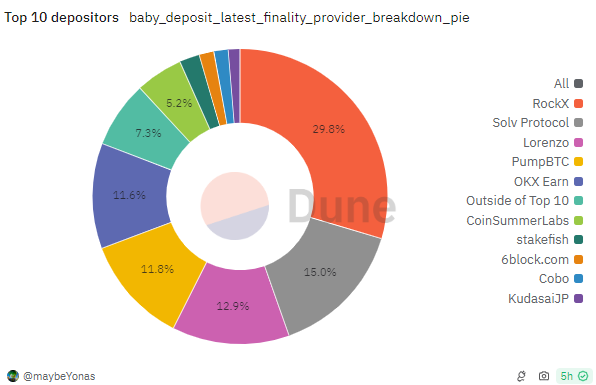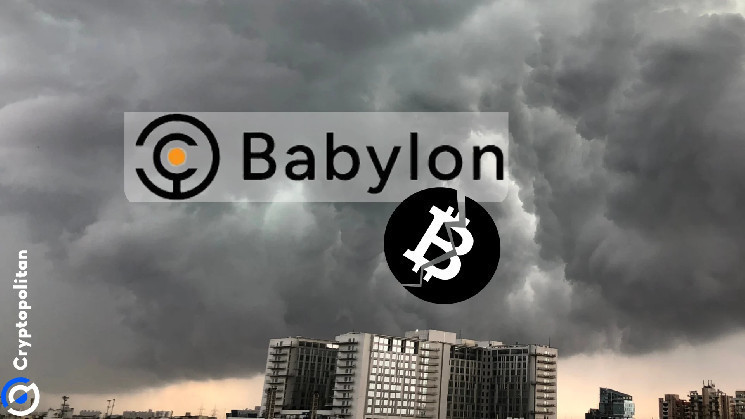تستعد شركة Babylon Labs، وهو مشروع جديد للتخزين غير الودي، لحدث Cap-2 الخاص بإيداعات Bitcoin (BTC). وقد عقد المشروع بالفعل حدثًا مماثلاً، مما أدى إلى ارتفاع رسوم المعاملات.
حددت شركة Babylon Labs حدث التوقيع على Cap-2 في 9 أكتوبر. ومع ذلك، نظرًا لإنتاج الكتلة بشكل أسرع، سيتم الوصول إلى الكتلة المستهدفة في 8 أكتوبر. وقد بدأت Babylon Labs بالفعل الساعات الأخيرة من العد التنازلي، المتوقع في الساعة 07:00 بالتوقيت العالمي.
⏳ العد التنازلي بدأ! ⏳
استعد لمشاركة عملة البيتكوين الخاصة بك — نحن على بعد حوالي 6 ساعات من إطلاق Cap-2!
⏰ وقت البدء المقدر: 7 مساءً بالتوقيت العالمي
— بابل (@babylonlabs_io) 8 أكتوبر 2024
After that, users will have exactly 10 blocks to make their deposits. Before the event, BTC fees remained low at $1.19, with even lower baseline values around $0.84. The Bitcoin network is not too busy after the usage of Ordinals and Runes slowed down.
The late Babylon Labs event lifted fees 10 times, to above $7. However, the fee rally is small compared to previous BTC congestion times, as the leading coin is now held closely with fewer active transactions.
The creation of FOMO means the drive to deposit BTC for passive earnings may boost transaction fees temporarily. The previous staking session at the end of August also created an uptick in fees. The staking session is set to start at block 864790, in fewer than 50 blocks from the time of writing.
There will be no cap to staking, but Babylon Labs will accept transactions included until block 864799. This time, the minimal transaction is 0.005 BTC, but the maximal cap will be lifted up to 500 BTC. The current Cap-2 event happens at a similar price range compared to the August 26 staking round. BTC was in the $62,000 range during both events.
If the transaction misses the final block, it will have to be unbounded for a fee of 0.00032 BTC. Depositing BTC within the correct blocks will also assign points to some of the depositors, with regional restrictions.
Babylon Labs wants to offer secure liquid staking
Babylon Labs aims to offer native BTC re-staking to tap the liquidity of the underlying coin and secure an L2 ecosystem. The mechanism is similar to liquid staking on Ethereum or Solana, but using the native Bitcoin chain. Delegated BTC is used to vote on protocol finality. Malicious actors who are discovered will have the staked BTC slashed from their holdings.
The previous lockup event was capped at 1,000 bitcoins, which are still held in the protocol. The staking mechanism requires a finality provider, listing multiple hubs that will hold a fraction of the delegated BTC.
Depositors remain in control of their assets, but finality providers are key in storing a larger stake. They are similar to Eigen’s Actively Validated Services, which receive a delegated ETH stake. Finality providers will use the delegated BTC to produce blocks and ensure on-chain finality.

During the first staking event, a total of 18,187 depositors spread a total of 1,000 BTC among all participating finality providers. Most of the deposits landed with the top 5 providers. All the BTC staked are not really wrapped, bridged or sent to a third party.
Instead, users issue a transaction that locks the BTC on their side and can only unlock the assets after paying the unbounding fee. All staked BTC is protected by a timelock script until the user pays the unbounding fee. The BTC does not actually leave the user’s wallet, but the locked coins will be subtracted from the final balance.
Staked BTC that are outside the predetermined 10 blocks will not accrue points for eventual token farming. The number of points for a whole BTC will increase from 3,125 to 10,000, to be used in an eventual airdrop.
Bitcoin’s L2 development is slower and at an earlier stage compared to Ethereum. Babylon Labs aims to create a similar ecosystem of L2, data availability layers, and oracles, with no centralized coordinator. The first round of Bitcoin staking has already produced several apps, including a version of the Cosmos Hub, ANKR, as well as several specialized wallets.
Bitcoin staking is considered a Web3 activity. Self-custodial or plain BTC wallets are not eligible, but only Web3-enabled wallets. Those include Bitget, Binance’s app, imToken, Keystone, OKX Wallet, OneKey and Tomo.
–
Cryptopolitan reporting by Hristina Vasileva.
